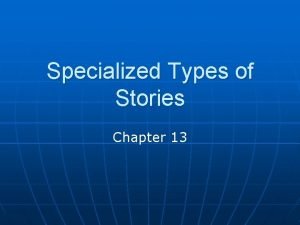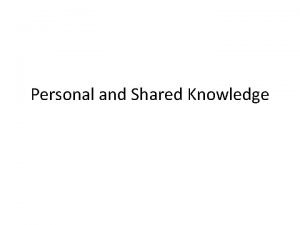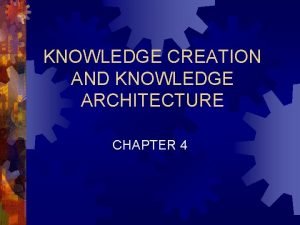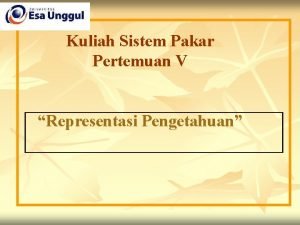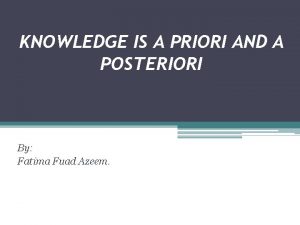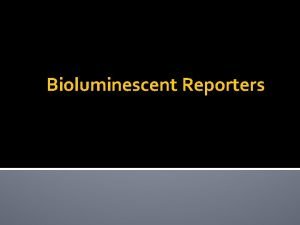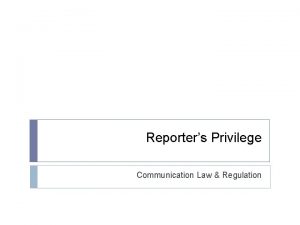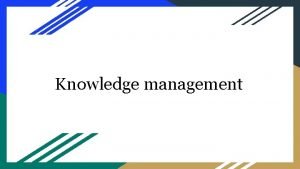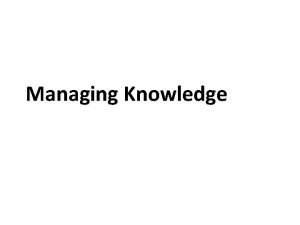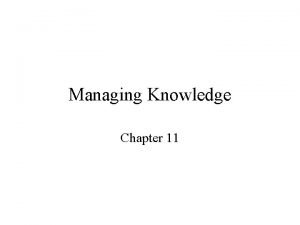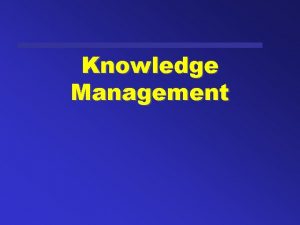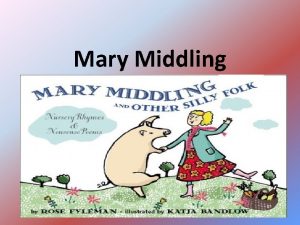Knowledge Management System Reporters Koppin Mary Nicole Decierdo










- Slides: 10

Knowledge Management System Reporters: Koppin, Mary Nicole Decierdo, John Eldrick Malna, Jahara Papandayan, Sittie Johayra

Contents I. Definition II. Types III. Process IV. Elements V. Advantages & Disadvantages

Knowledge the fact or condition of knowing something with familiarity gained through experience or association. Knowledge Management System (KMS) that stores and retrieves knowledge, improves collaboration, locates knowledge sources, mines repositories for hidden knowledge, captures and uses knowledge, or in some other way enhances the KM process. Latest Technology Social/Structure Mechanism Knowledge Management System

Types of KMS 1. Structured Knowledge System – collection and organization of formal textual documents 2. Semi-structured Knowledge System – “ “ “ all types of digital content (videos, images, emails, etc. , ) 3. Knowledge Network System – database that stores profiles of contentarea experts across the firm 4. Neural Network - the computer program “learns” patterns by sifting through the data

5. Expert System – converts knowledge into IF-THEN statements 6. Fuzzy Logic – uses approximate rather than precise reasoning in making decisions 7. Case-based Reasoning – captures the past experiences of individuals working in the organization and stores them in a database for later retrieval when a similar situation is encountered 8. Genetic Algorithm – can determine the optimal solution to a problem even when it has hundreds of variables 9. Intelligent Agent – can be programmed to automatically search for important information based on the users personal preferences

KMS Process Creating Structuring Application Sharing

• Creating - data acquisition Types: Ø Explicit knowledge- put in paper or electronic format Ø Tacit knowledge- created in minds people. • Structuring – information mapping, storage, and retrieving

KMS Elements • 1 - Document Storage. A repository for structured assets such as Word documents, presentations, PDFs and spreadsheets. • 2 – Publishing Knowhow. Organisational Wikis are the most appropriate place to the storage and consumption by users of items that tell someone ‘how’ to do something. • 3 – People Discovery. The ability to find expertise is key element of keeping the organisation agile and getting things done quickly. • 4 – Messaging & Discussions. The ability to crowd source opinions and have questions rapidly answered by experts in order to utilise the vast array knowledge held by their workforce.

KMS Advantages Improved staff productivity Increased business efficiency Improvement in the goods or services Increased customer satisfaction

KMS Disadvantages Complex High maintenance Costly Information Relevancy
 In georgia mandated reporters include
In georgia mandated reporters include Canra passed
Canra passed Four types of stories
Four types of stories Who is a mandated reporter
Who is a mandated reporter Mary wollstonecraft mary a fiction
Mary wollstonecraft mary a fiction Shared knowledge vs personal knowledge
Shared knowledge vs personal knowledge Knowledge shared is knowledge squared meaning
Knowledge shared is knowledge squared meaning Knowledge shared is knowledge multiplied
Knowledge shared is knowledge multiplied Knowledge creation and knowledge architecture
Knowledge creation and knowledge architecture Contoh shallow knowledge dan deep knowledge
Contoh shallow knowledge dan deep knowledge Posteriori proposition
Posteriori proposition


